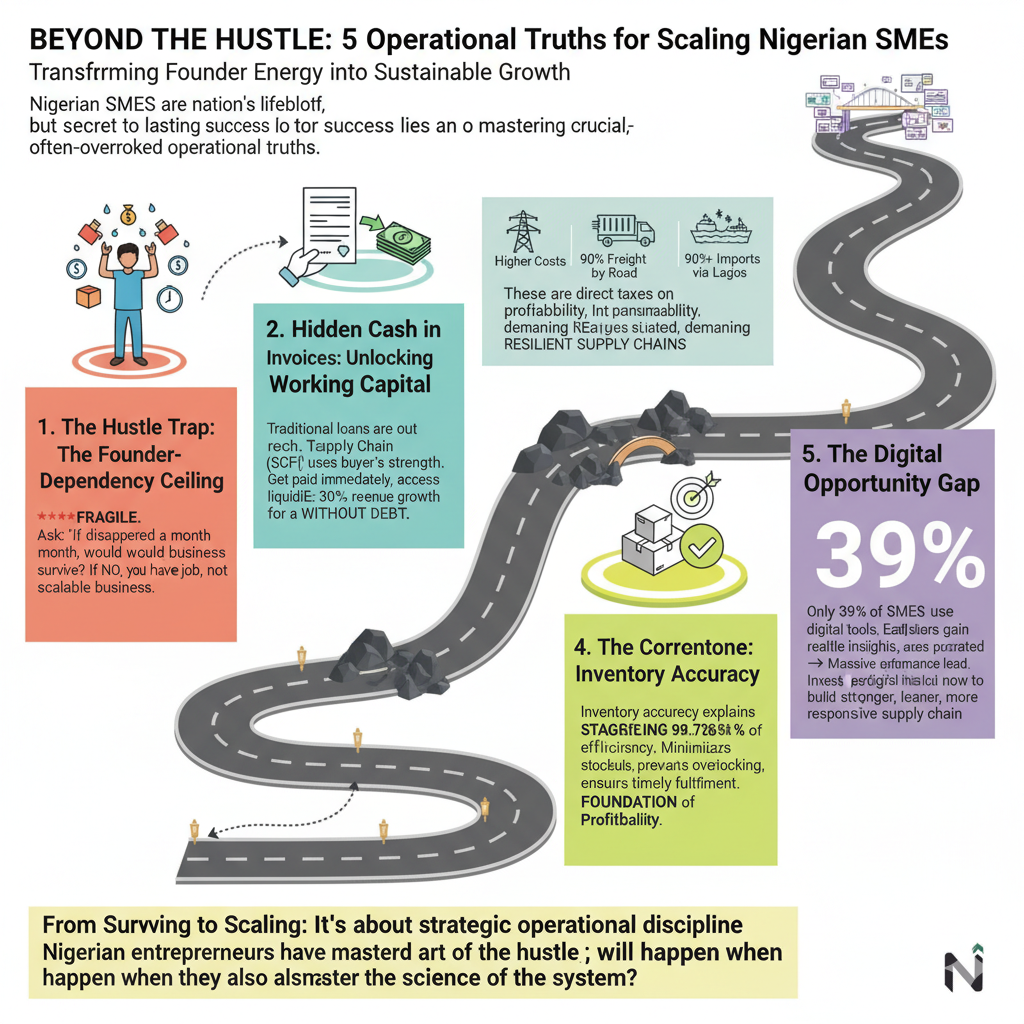Introduction:
Beyond the Hustle
Nigeria’s economy
pulses with the energy of its entrepreneurs. Small and Medium-sized Enterprises
(SMEs) are the lifeblood of the nation, making up nearly all businesses in the
country and providing the majority of jobs. From the tech hubs of Lagos to the
bustling markets of Kano, there is no shortage of creativity, ambition, and an
endless supply of "hustle."
Yet, despite this
vibrant entrepreneurial spirit, a frustrating reality persists: most of these
businesses fail to scale. They thrive on the founder's energy but remain
vulnerable to shocks, unable to achieve sustainable growth. The ambition is
there, but the foundation is often shaky.
The difference between a business that merely survives and one that truly succeeds often lies in a place most founders overlook. It’s not about working harder or having a more popular brand on Instagram. The secret is hidden in the operational backbone of the business, its supply chain. Mastering a few surprising, often-ignored truths about how a business actually runs is what separates fleeting hype from lasting success.
1. Your Business Is
Built on Hustle, Not Systems, And That's a Trap
The primary weakness
preventing Nigerian SMEs from scaling isn't a lack of market opportunity; it's
an absence of internal structure. In the race for visibility and revenue, a
critical flaw emerges: Hype often outweighs systems. This leads to
businesses that are entirely dependent on the founder's daily firefighting and
micromanagement, making them incredibly fragile.
Many businesses look
successful from the outside but are internally chaotic. Operations depend on
the founder's memory, personal relationships, and constant intervention. When
the founder is present, things move. When they're not, the entire operation
grinds to a halt. This founder-dependency is a ceiling on growth.
A fashion
entrepreneur, whose brand was a sensation on social media, captured this
vulnerability perfectly after a key employee's departure nearly collapsed her
business:
“The business looks
strong on the outside, but it all rests on me.”
Ask yourself the most critical question, and answer it honestly: 'If I disappeared for a month, would my business survive?' If the answer is no, you don't have a scalable business; you have a high-stakes job.
2. There's Hidden
Cash in Your Invoices, And It's Not a Loan
For countless Nigerian
SMEs, a chronic lack of access to working capital is the single biggest barrier
to growth. Traditional bank loans are often out of reach, demanding extensive
collateral, lengthy application processes, and high interest rates that small
businesses cannot afford. This liquidity gap means SMEs can't buy raw
materials, fulfill large orders, or manage day-to-day costs, even when they are
profitable on paper.
A modern solution is
emerging to solve this crisis: Supply Chain Finance (SCF). In simple terms,
SCF allows an SME (the supplier) to get paid almost immediately for an invoice
sent to a large corporate buyer. Instead of waiting 60 or 90 days for payment,
a third-party financier pays the SME upfront. The large buyer then repays the
financier on the invoice's original due date.
This is the game-changing twist. In a traditional loan, the bank looks at your SME's limited credit history and sees risk. With SCF, the financier looks at your invoice to a large, credible company and sees a guaranteed payment. Your buyer's strength becomes your strength, unlocking cash without you having to prove a thing. It's a way to access liquidity without adding any debt to your balance sheet. For instance, one plastic packaging manufacturer in Lagos used a digital SCF platform and grew its revenue by over 30% in less than a year, all without taking on new debt.

3. The True Scale
of Nigeria's Infrastructure Gap Is Staggering
Every business owner
in Nigeria knows that infrastructure is a challenge. But while many have
adapted to the daily frustrations, few appreciate the true scale of the problem
and its direct, quantifiable impact on their bottom line. The actual numbers
are staggering.
- Power: Due to an inconsistent national grid, Nigerian businesses are
forced to rely on diesel generators. This makes their cost of power 3.8
times higher than it would be otherwise. This isn't an inconvenience;
it's a direct tax on your profitability, forcing you to choose between
pricing yourself out of the market or sacrificing your margins.
- Transportation: The logistics industry is almost entirely
uni-modal. Road haulage transports 90% of all freight in the
country, placing immense pressure on a road network that is often in poor
condition. This forces near-total reliance on roads, where poor conditions
lead to damaged goods, vehicle wear-and-tear, and unpredictable delivery
timelines that kill customer trust.
- Ports: The system is dangerously centralized. Over 90% of all goods
imported into Nigeria are brought through the ports in Lagos. This
means your inventory, and your cash is likely sitting idle for weeks, not
because of your planning, but because of a national bottleneck you must
strategically plan around.
These are not just inconveniences; they are fundamental operational hurdles that directly inflate costs, create unpredictable delays, and erode profit margins. A successful business strategy isn't about wishing these problems away; it's about building a supply chain resilient enough to navigate them.
4. One Simple
Metric Explains 98.7% of Your Warehouse Problems
Warehouse and supply
chain management can feel overwhelmingly complex, filled with dozens of
processes, technologies, and metrics. However, deep analysis reveals that one
key performance indicator (KPI) has a shockingly outsized impact on overall
success.
A detailed study of
warehouses in Edo State found that inventory accuracy plays the most
significant role, explaining a staggering 98.7% of the variation in
operational efficiency. This directly challenges the 'hustle' model. A
business that runs on the founder's memory cannot achieve high inventory
accuracy; it requires a disciplined system.
Why is this one metric
so powerful? Because high inventory accuracy is the foundation of a reliable
and cost-effective operation. When you know exactly what you have and where it
is, you:
- Minimize stockouts, preventing lost sales and frustrated
customers.
- Prevent overstocking, which ties up precious cash in unsold
goods.
- Ensure timely and accurate order
fulfillment, which is a
critical factor for customer satisfaction.
For any business that holds stock, an obsessive focus on improving inventory accuracy isn't just one of many priorities, it is the cornerstone of operational excellence and profitability.
5. Most Businesses
Aren't Digital, Creating a Massive Opportunity Gap
Despite the global
push towards digitization, the adoption of digital technology for supply chain
management among Nigerian SMEs remains surprisingly low. A study of
manufacturing enterprises in Southwestern Nigeria found that only 39% had
adopted digital tools for their supply chain operations.
This slow adoption
isn't just about mindset; it's compounded by the infrastructure realities
discussed earlier. With unreliable power, the barrier to entry for 'always-on'
digital systems is understandably high, yet overcoming it is where the
competitive advantage lies. The research confirmed a significant and positive
relationship between digital technology adoption and supply chain performance,
creating a massive "performance chasm" between the few who have
embraced technology and the majority who have not.
This means while your
competitors are still tracking inventory in spreadsheets and confirming orders
via WhatsApp, a digital-first business has real-time stock levels, automated
reorder points, and a clear view of their entire operational pipeline.
For ambitious entrepreneurs, this gap represents a time-sensitive opportunity. By investing in digital tools now, from inventory management software to transportation management systems, early adopters can build a stronger, leaner, and more responsive supply chain before the rest of the market is forced to catch up.
Conclusion: From
Surviving to Scaling
The path from survival
to scale for a Nigerian business is paved with strategic, operational
discipline. The energy of the hustle can only take you so far. True,
sustainable growth requires a deeper understanding of the systems that power
your business.
To succeed, you must
move from founder-dependent hustle to robust systems that can run on their own.
You must unlock hidden cash with innovative finance, build resilience to
navigate infrastructure realities, focus on core metrics like inventory
accuracy, and seize the digital opportunity before it becomes standard
practice. These aren't just business tips; they are the fundamental truths that
will define the next generation of Nigerian success stories.
Nigerian entrepreneurs
have mastered the art of the hustle; what will happen when they also master the
science of the system?
